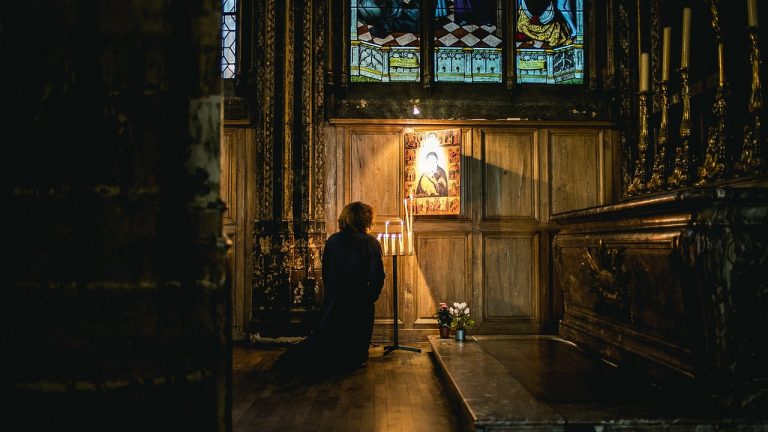30TH SUNDAY IN ORDINARY TIME
Sir 35:12-14,16-19 ; Ps 32
2Tim. 4:6-8, 16-18; Lk 18:9-14
THE POSTURE OF PRAYER
Last week we spoke about persisting in prayer. That, we should never give up on prayer; we should Pray Until Something Happens because our God cares and he will listen.
This week our gospel from Luke 18:9-14, is about our attitude or posture at prayer. Jesus tells a parable of two people who went to pray, a Pharisee and a Tax Collector, where one went home justified and the other did not. We must be careful not to turn this parable into one about the hypocrisy of the Pharisee. Though the gospels speak about the hypocrisy of the Pharisees and that is what comes easily to us when we think of them, we must note also that they were among the most pious and religious people in Israel.
The Pharisee and the Tax Collector went to the Temple to pray. The Pharisee prays about his faithfulness in obeying the law and avoiding evil. He compares himself to the tax collector and all others who do not obey God’s commandments.
We hear also of the prayer of the tax collector, who not daring to get close or raise his eyes to heaven prays accepting that he was a sinner needing God’s mercy. In fact the literal translation of the prayer of the tax collector would be “God be merciful to me, the sinner” he prayed as if he was the very definition of a sinner and as such seeking for God’s love and mercy. It is this prayer that is acceptable to God, Jesus points out.
Both men went to the Temple to pray. They both took a posture of prayer, one “stood by himself” and the other “far off”, but one was justified and the other was not. This should make all of us examine the way we pray and the kind of posture we put up at prayer when we come before the Lord of Host.
God Does Not Need Your Righteousness.
Jesus tells the parable for two reasons. To address those who prided themselves in their righteousness. God is utter holiness. We should not throw our ability to live good lives before him like a trump card. He owes us nothing and we cannot impress him. In fact we should realise that our ability to live good lives is still by the help of his grace. In fact scripture says “ …and all our righteousness is like a polluted garment…” before the Lord (Isaiah 64:6). Next time you think you can pride yourself in your holiness remember that it is a vain and useless exercise that draws no grace and pleasure from God.
You Are Not Better Because Others Are Worse.
In the prayer of the Pharisee he compares himself to the rest of mankind and especially the tax collector. Don’t we do that sometimes? Don’t we think that we are better because in our opinion others are doing worse? That may work in the commercial enterprise where there is competition and one must prove his product to be better. But not in our relationship with God and certainly not when we are before him in prayer. The Pharisee was unconscious of his own sinfulness but that of the rest of mankind and the tax collector. To compare your spiritual life to others is to live your live in self-deceit. It is to be self-conceited, arrogant and complacent. This attitude is repulsive to God. For “there is no one righteous, not even one…” (Romans 3:10). Let us approach the throne of mercy as sinners and we shall be justified by the Lord. A Yiddish proverb says “Better a sinner who knows he is a sinner, than a saint who knows he is a saint”.
Humility
The gospel reading ended with Jesus commenting saying that, “anyone who exalts himself will be humbled….”(Lk 18:14). Humility is the middle ground between arrogance and false humility. The one who is truly humble is honest with himself. He knows his limitations and accepts them and is grateful to God for his gifts. To deny the gifts you have is false humility. To despise others who are not as good as you are, is pride and arrogance. The posture of humility rather than pride, makes God’s heart beat for mercy.
Seek God
In prayer we come to seek God the more. Like our catechism says. We seek to know him more, love him more and serve him more. No one of us can arrive at knowing completely. We would spend our lifetime doing that and there would be much more to know that we know. The moment of prayer then is a time to have some relationship with our God who is eternal and surpassing all knowledge and understanding. Paul said that God made people everywhere “that they should seek God, and perhaps feel their way toward him and find him. Yet he is really not far from each one of us” (Acts 17:26-28). Seek him. You will find him, a merciful father.
Accepting God’s Will
When we approach God in prayer, we should do so humbly seeking to know his will. We must note that prayer is not a tool to use to order God about but to gain his grace and help us to understand his will. In prayer he grants us strength to endure the difficulties he has allowed to come our way. In prayer he also saves and redeems us from the wickedness and attacks of the devil. What is important is that in our prayer, we must put ourselves in his hands knowing that he knows all things and knows better.
May God show us his mercy and hear our prayers. In moments when we cannot pray, may he give us the Holy Spirit to teach us to Pray.
God bless you.
By Fr. Delight Arnold Carbonu




